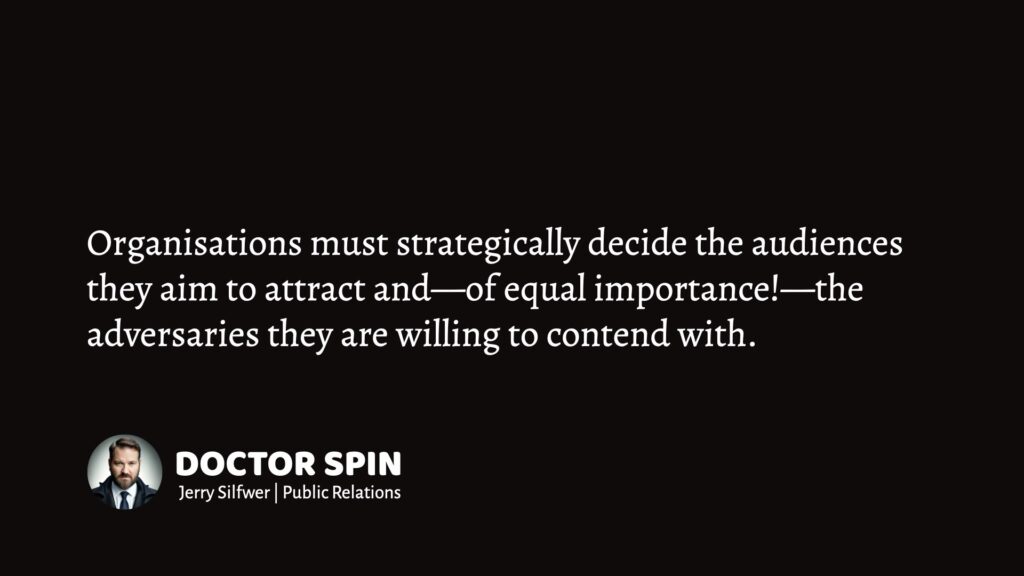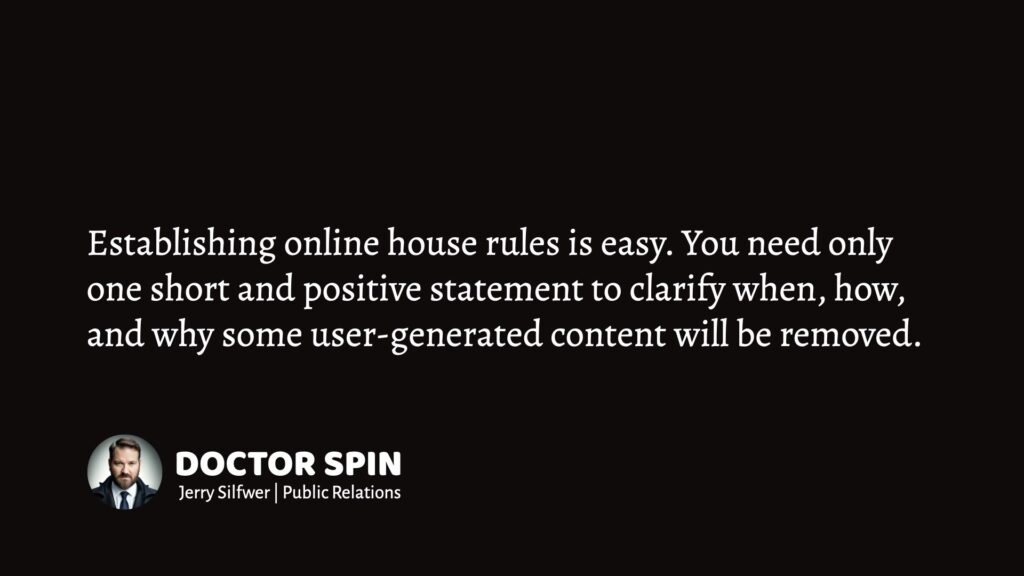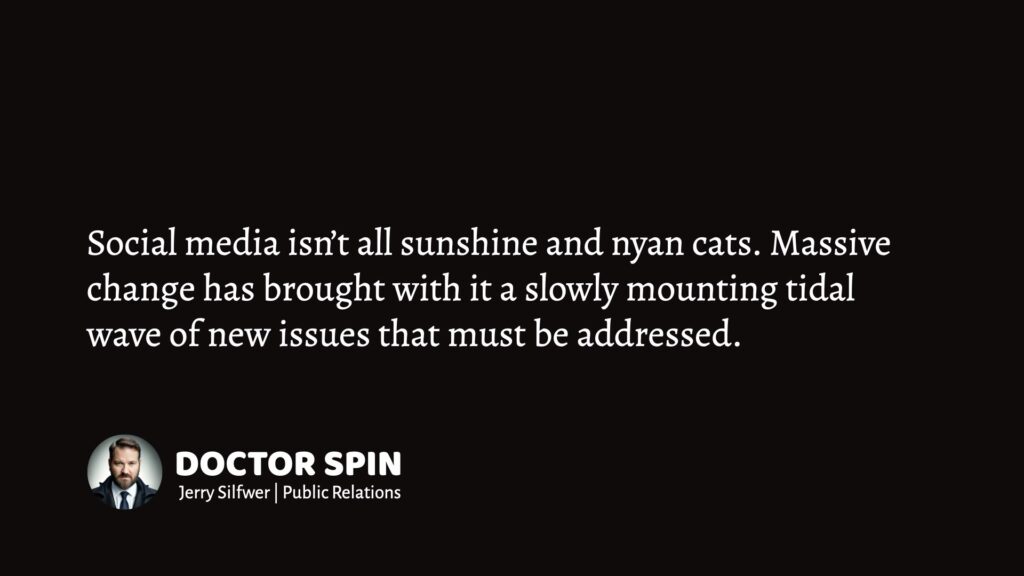How do you deal with online trolls?
I often help companies and organisations deal with online trolls.
“Of course, humans have always had this potential for the irrationally vindictive, but the advent of the internet finally allowed it to thrive. Because as soon as you stuck someone behind a computer, a dangerously insular shield of anonymity came down and, for those inclined, happily took over.“
Source: Gizmodo 1Feinberg, A. (2014, October 30). The Birth of the Internet Troll. Gizmodo; Gizmodo. https://gizmodo.com/the-first-internet-troll-1652485292
Here we go:
Pick Your Opponents Proactively
The Paradox of Prominence
The “dark side” of what drives people’s engagement can be a true PR challenge. This phenomenon, where every strength inherently possesses a corresponding downside, can be called the paradox of prominence.

An example of this paradox is the halo effect, where physical attractiveness becomes an asset for a spokesperson. Attractiveness often leads to positive biases; attractive individuals are frequently perceived as more credible and competent. 2Eagly, A. H., Ashmore, R. D., Makhijani, M. G., & Longo, L. C. (1991). What is beautiful is good, but…: A meta-analytic review of research on the physical attractiveness stereotype. … Continue reading 3Silfwer, J. (2023, December 17). The Halo Effect: Why Attractiveness Matters in PR. Doctor Spin | The PR Blog. https://doctorspin.net/halo-effect/
However, this same attribute can spark negative reactions. Critics might claim that the individual’s success or visibility is primarily due to their looks, undermining their competencies. This duality illustrates how the qualities that draw positive attention can simultaneously attract criticism and scepticism.
Competence, another valuable trait, often encounters similar pitfalls. Highly competent individuals inspire confidence and admiration. Nevertheless, this competence can be perceived negatively when willfully interpreted as arrogance. Studies suggest that while competence garners respect, it can also lead to social penalties, such as envy and resentment. 4Fiske, S. T., Cuddy, A. J. C., Glick, P., & Xu, J. (2002). A model of (often mixed) stereotype content: Competence and warmth respectively follow from perceived status and competition. Journal of … Continue reading
Examples of the Paradox of Prominence
The paradox of prominence seems to be an inherent aspect of human interest dynamics.
| Prominence | Positive Outcome | Negative Outcome |
|---|---|---|
| Physical attractiveness | Enhanced credibility and trust | Accusations of superficial success |
| High competence | Respected and trusted as an expert | Perceived as arrogant or unapproachable |
| Charisma | Ability to inspire and attract followers | Viewed as manipulative or insincere |
| Strong advocacy | Increased support and mobilization for a cause | Target of intense criticism from opponents |
| Wealth | Seen as successful and influential | Resentment and accusations of greed or unfairness |
| Assertiveness | Effective leadership and decision-making | Labeled as domineering or aggressive |
| Innovation | Admired for creativity and forward-thinking | Resistance to change and criticism from traditionalists |
| High visibility | Greater recognition and influence | Increased scrutiny and loss of privacy |
| Generosity | Viewed as kind-hearted and philanthropic | Suspected of ulterior motives |
| Success in competitive fields | Role model and symbol of achievement | Envy and attempts to undermine accomplishments |
We must recognise that with every increase in visibility, there is a corresponding increase in scrutiny and criticism.
“Being Loved by Everyone”
Earning public awareness comes with inevitable costs.
In the quest for greater visibility and influence, it is critical to acknowledge that “being universally well-liked” is a naïve and unrealistic goal.
“Being loved by everyone” can never be a viable public relations strategy.
By strategically harnessing this paradox, public relations professionals can manage public perception by internalising expected “downsides” as additional awareness drivers.
Learn more: The Paradox of Prominence
Categorise Your Online Trolls
Spin Academy | Online PR Courses
Types of Online Trolls
There are various types of online trolls — and they behave differently. Depending on how and where they communicate, you can find clues on how to best deal with them.
I use the following categorisation of online trolls:
Please note: Publics providing fair critique or voicing legitimate concerns should never be categorised — or treated! — as online trolls.
Learn more: How To Deal With Online Trolls
💡 Subscribe and get a free ebook on how to get better PR.

Use the High Road Tonality
The Stoic Tonality
An organisation is the polyphonic sum of all its coworkers. Imagine extracting each coworker’s most virtuous and mature traits and combining them into one voice — the Stoic tonality.
Stoic Tonality Examples
“Why doesn’t your brand speak out against industrial overfishing killing our oceans?”
“As a company that sells fishing gear, we want our oceans — and all animals and plants living in them! — to be healthy and plentiful. We, too, were disturbed by the recent news of overfishing. How could anyone not be? We now ask ourselves, how can our company make more of a difference? Honestly, we’re discussing our strategy for sustainability every day. I cannot say how or when we might take specific action regarding this latest news, but rest assured that we’re taking the general issue of saving our oceans seriously.”
“Why doesn’t your brand engage in Black Lives Matter?”
“As for right now, we’re listening. We’re listening to the stories being told. We’re listening to understand better how we can learn and grow as a company. As for inclusiveness and human rights in general, we think we’re doing a great job, and part of that is to stay open and carefully listen to people’s stories. We might take specific actions, but we’re listening and learning.”
“Why doesn’t your brand join our protests against toxic masculinity and the patriarchy?”
“Honestly, we’re a product company. We make products for anyone who likes them. And I dare say that we’re experts in making these products. However, we’re not experts on ideologies or societal structures. So, for now, we listen. And we continue to focus on making the best products that we can. For everyone. We believe that’s our best way of contributing at this point.”
“Why doesn’t your brand sign our petition to boycott all companies on our Environmental Black List?”
“As a company, we operate differently. Instead of signing petitions or participating in other public demonstrations, we take action within our sphere of influence. And I dare say that our many environmental initiatives are making a lot of difference worldwide relative to our size and reach. If we were to sign your petition, we would first have to use our resources to research the legitimacy of its creators and then make sure that none of the companies on that list is being wrongfully accused. While it would be possible, we’ve decided that we can do more good by directing our resources to where we can make the most difference.”
“Why doesn’t your company act against your female employees who take time off for abortions?”
“All our employees are grown-ups, and what they do on their own time is frankly none of our business. We’re a large company, and we have employees who are pro-life and pro-choice. We believe we have a workplace where people can have different opinions but still respect each other and work well together.”
“Why hasn’t your company offered your thoughts and prayers for the victims and their families of the school shooting?”
“The victims and their families have our empathies, of course. I speak for everyone working at our company when I say we were devastated by the news as everyone else. But you’re right that we haven’t posted any status updates about the shooting on our Facebook page. It’s not that we don’t care (we do!), it’s just that we focus our updates on our products and services and how they make a positive difference in the world.”
Learn more: The Stoic Tonality
Establish House Rules

Spin Academy | Online PR Courses
Online House Rules (Social Media Policy Statements)
An organisation’s social media accounts must be managed. While social media reactions cannot be fully controlled, a supportive culture can be cultivated in your organisation’s feeds.
Keeping branded social media accounts, forums, and comment sections in check will require active moderation. Active moderation means deleting, banning, blocking, unfollowing, and reporting abuse.
It’s bad form to kick someone out arbitrarily. Kicking someone out for making your brand uncomfortable is a recipe for PR backlash.
All brands must, therefore, establish online house rules.
(Also known as social media policy statements.)
Still, establishing online house rules is easy. You need only one short and positive statement to clarify when, how, and why some user-generated content will be removed.
House Rule Examples
Here are a few short, encouraging, and positive statements for different types of brands:
If it’s unclear whether or not someone violates your house rules, revise them and make any changes known to your brand community.
Learn more: Online House Rules (Social Media Policy Statements)
💡 Subscribe and get a free ebook on how to get better PR.

Spring Clean Your Accounts (Ban, Block, Report)
“Canadian psychologists Erin Buckels, Paul Trapnell, and Delroy Paulhus set up a survey of personality inventories matched with ‘Internet commenting styles’ — in other words, they attempted to psychoanalyse commenters, which should be cause for a Nobel prize (and hazard pay) in itself. What came from the study will likely surprise no one: people who like to troll are also likely to show signs of ‘sadism, psychopathy, and Machiavellianism.’”
Source: Time 5Chayka, K. (2014, February 13). Internet Trolls Are Actually Sadists, Study Finds. Time; Time. https://time.com/8265/internet-trolls-are-actually-sadists-study-finds/
People who violate your online house rules (e.g., comment policy) are online trolls. You can ban, block, and delete them. It’s tedious work, but you should spring clean amongst your fans, followers, and subscribers, even if there are thousands.
Spring cleaning means sifting through your online community and looking for prominent troll accounts. When you find such accounts, delete them, ban them, block them, or unsubscribe them. Banning, blocking, and reporting are applicable when online trolls are engaging in the feeds of your brand’s social accounts or comment forms on your website or app:
While spring cleaning might decrease your community numbers, you’ll benefit from better algorithmic scores.
Affiliate: I use Email List Validation to protect my sender’s reputation by keeping my PR email lists free from bouncing emails.
Nurture a Brand Community
Nothing will protect your brand better than nurturing a positive and ongoing conversation across all your social channels.
When the shit hits the fan, having your community take your side is crucial. And if they favour your brand’s online environment, they won’t easily allow online trolls to destroy what they’ve helped build.
Affiliate: I use Mailchimp as my default email list manager.
Implement Social Tech
Social technologies could allow you to shape and manage your online community’s behaviours.
You can nurture a positive online brand culture by utilising individual comment replies, reactions, pins, highlights, badges, top lists, scores, sorting mechanisms, rewards, etc.
Here are a few on-site examples:
Implement “Staff Mode”
When online trolls attack your brand, their activity must be monitored, and actions must be taken immediately. The sooner you take action, the better.
If online trolls are allowed to wreak havoc without the brand taking any measures for too long, their activity will attract others, and your problems might become more prominent than they have to be.
So, when your brand deals with online trolls, staff up accordingly. It’s rarely a good idea for everyone to leave work while online trolls ramp up during the night.
Use Fancy Copywriting
Online trolls might be bad people, but you can throw many types of them off by reacting in a way they wouldn’t expect you to.
There are many successful case studies of brands using fancy copywriting to fight against online trolls. The idea is to make the general online audience favour your brand instead and turn them against online trolls.
Fancy copywriting might be your choice weapon if you take the fight.
Be charming.
Be clever.
Fancy copywriting is an art form, though.
You need a copywriter or a PR writer who can produce glimmering online responses in a high-pressure situation.
Monitor and Evaluate
When online trolls attack, it’s challenging to gauge proportionality. Coworkers might be upset and feel personally attacked, and leaders might feel pressured to push for action.
Your brand’s first line of defence against making bad calls is data. Data is harvested through online monitoring systems and then evaluated.
Attempt De-Platforming
If online trolls are giving your brand grief outside your brand platforms (social accounts, websites, apps, etc.), you might still be able to ban, block, or report their content. However, this is a high-stakes strategy and should only be used cautiously.
Brands should be careful about trying to de-platform someone. Although they might be online trolls, they’re not in violation of your house rules anymore. Because they’re not in your “house.”
The only time de-platforming is a reasonable course of action is if an online troll violates the terms or conditions stated by the social network. But even then, there’s a high probability that the social network won’t respond to your reports.
“Scores on the Dark Tetrad personality test revealed that trolls are, by far, more likely to have narcissistic, Machiavellian, psychopathic, and sadistic personality traits. Okay, so that’s not so surprising. But Buckels and colleagues wanted to take it a step further: how much enjoyment are these trolls getting from their online shenanigans? The researchers constructed their own Global Assessment of Internet Trolling (GAIT), which asked such questions as ‘I have sent people to shock websites for the lulz’ and ‘The more beautiful and pure a thing is, the more satisfying it is to corrupt.’ (Sadly, some people indeed answered these questions with a ‘yes’).“
Source: The Guardian 6Jordan Gaines Lewis. (2014, February 25). Internet trolls are also real-life trolls. The Guardian. … Continue reading
Read also: De-Platforming as a Public Relations Strategy

THANKS FOR READING.
Need PR help? Hire me here.

PR Resource: List of Social Media Issues
List of Social Media Issues
Social media isn’t just nyan cats and double rainbows.
With massive change come new social media issues we must deal with.

Here are a few examples of social media issues:
Read also: The List of Social Media Issues
Annotations
| 1 | Feinberg, A. (2014, October 30). The Birth of the Internet Troll. Gizmodo; Gizmodo. https://gizmodo.com/the-first-internet-troll-1652485292 |
|---|---|
| 2 | Eagly, A. H., Ashmore, R. D., Makhijani, M. G., & Longo, L. C. (1991). What is beautiful is good, but…: A meta-analytic review of research on the physical attractiveness stereotype. Psychological Bulletin, 110(1), 109 – 128. https://doi.org/10.1037/0033 – 2909.110.1.109 |
| 3 | Silfwer, J. (2023, December 17). The Halo Effect: Why Attractiveness Matters in PR. Doctor Spin | The PR Blog. https://doctorspin.net/halo-effect/ |
| 4 | Fiske, S. T., Cuddy, A. J. C., Glick, P., & Xu, J. (2002). A model of (often mixed) stereotype content: Competence and warmth respectively follow from perceived status and competition. Journal of Personality and Social Psychology, 82(6), 878 – 902. https://doi.org/10.1037/0022 – 3514.82.6.878 |
| 5 | Chayka, K. (2014, February 13). Internet Trolls Are Actually Sadists, Study Finds. Time; Time. https://time.com/8265/internet-trolls-are-actually-sadists-study-finds/ |
| 6 | Jordan Gaines Lewis. (2014, February 25). Internet trolls are also real-life trolls. The Guardian. https://www.theguardian.com/science/head-quarters/2014/feb/25/internet-trolls-are-also-real-life-trolls |



